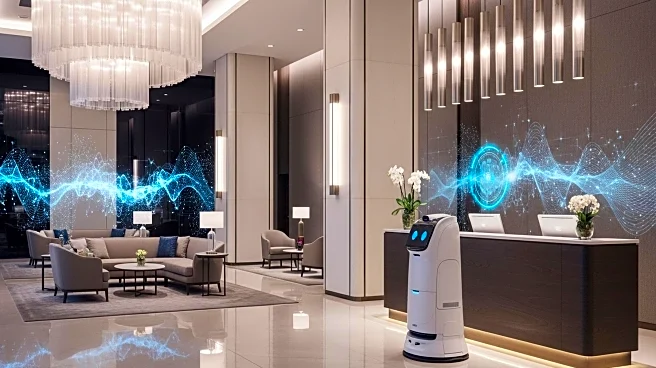What's Happening?
The hospitality industry is increasingly adopting artificial intelligence (AI) to improve guest interactions, streamline operations, and boost revenue. AI tools are being used to automate responses to guest inquiries, analyze reviews, and optimize pricing strategies. For instance, Guesty's ReplyAI tool helps hotels save time by generating automated responses, while their price optimizer has reportedly increased revenue by 25% and occupancy by 10%. Additionally, AI is being used to identify 'orphan nights' in booking calendars, offering discounts to fill these gaps, which has resulted in a 16% conversion rate for Host and Stay. AI is also enhancing staff efficiency by automating repetitive tasks, allowing hotel staff to focus more on guest interactions.
Why It's Important?
The integration of AI in the hospitality sector is significant as it addresses long-standing challenges such as improving guest satisfaction and operational efficiency. By automating routine tasks, hotels can reduce human error and enhance the overall guest experience. The ability to analyze and respond to reviews quickly helps maintain a positive reputation, which is crucial for attracting future bookings. Moreover, AI-driven pricing strategies and revenue optimization tools provide hotels with a competitive edge in a crowded market, potentially leading to increased profitability. The adoption of AI reflects a broader trend of digital transformation in the industry, which could set new standards for service delivery and operational management.
What's Next?
As AI continues to evolve, hotels may further integrate these technologies to personalize guest experiences and develop more sophisticated revenue management strategies. The focus will likely shift towards creating seamless communication channels between guests and hotels, using AI to anticipate guest needs and preferences. Additionally, there may be increased investment in AI tools that protect guest data privacy, ensuring compliance with regulations while leveraging AI's capabilities. The industry might also explore AI's potential in sustainability initiatives, such as energy management and waste reduction, aligning with global environmental goals.
Beyond the Headlines
The ethical implications of AI in hospitality, particularly concerning data privacy and the potential displacement of human labor, are important considerations. While AI can enhance efficiency, it is crucial to ensure that the technology complements rather than replaces human interaction, which is central to hospitality. The industry must navigate these challenges carefully, balancing technological advancement with ethical responsibility. Furthermore, the long-term impact of AI on employment patterns within the sector could lead to shifts in workforce skills and training requirements.











